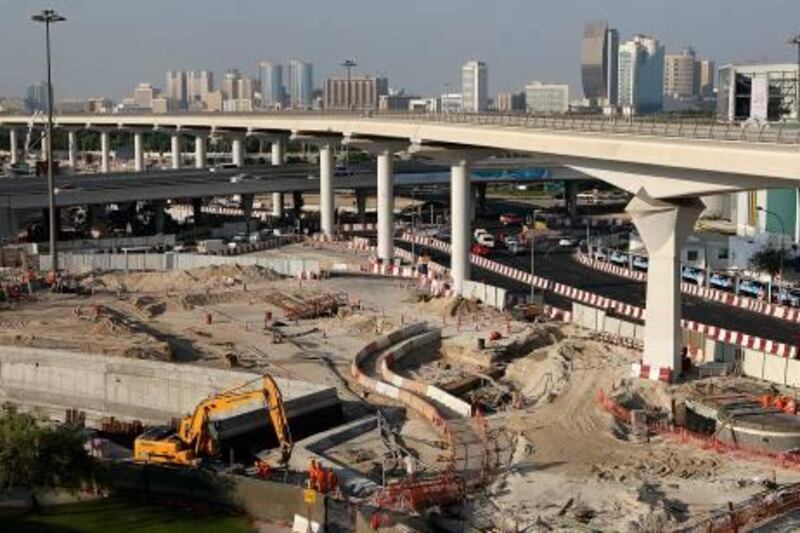DUBAI // Road projects have turned sections of the emirate into permanent construction sites, and completing them is high on motorists' New Year's wish list.
Drivers who spend at least an hour in traffic each day welcome the expansion of major thoroughfares such as the Sheikh Zayed and Emirates roads because they shorten commuting time.
But they yearn for an end to the rows of red cones and yellow road signs that are ever-present reminders of traffic diversions.
And help is on the way. The four Roads and Transport Authority (RTA) projects taken up this year include the extensive Parallel Roads project near Business Bay, approach roads to the Dubai Sports Complex and building up the streets leading to the residential/commercial Al Barsha area.
Ongoing projects involve construction at the First Interchange on Sheikh Zayed Road - formerly Defence Roundabout - Al Ittihad Road near Sharjah, and Emirates and Al Khail roads, both of which are important highways. The transport authority has said portions of the Sheikh Zayed Road scheme will be completed by the middle of next year, but other projects would take as long as three years.
"Work must go on. This is for the future," said a senior RTA official. "The RTA wants smooth traffic for all and this work will ensure that."
That view was backed by Varkki Pallathucheril, a professor of urban planning at the American University of Sharjah. He said sustained construction was a necessary evil in a constantly growing city.
"The challenge that the RTA faces is incredible," he said. "It is a monumental task to provide good and sufficient transport infrastructure. If you look around you can see that effort. We can quibble about the details, but that to me is not a useful discussion."
Two phases of work on Sheikh Zayed Road, including one in the busy Business Bay area, and streets leading to Dubai Sports City will be ready in 2011, said the RTA roads director, Nabeel Mohammed Saleh. Additional work in the Al Barsha district will be complete by early 2012. The programmes cost Dh400 million.
The Parallel Roads network will extend to almost 130km when completed over the next three years, with four tunnels and more than 50 bridges and interchanges.
__________________________________________
MORE
[ Clearer roads inspire moves to new communities ]
[ Dubai drivers yearn for end to road works ]
__________________________________________
In response to residents' complaints of inconvenience, Mr Saleh said the Dh4.4 billion project was necessary to ease congestion in the long run.
"We shall complete roads and interchanges but we also must take up new projects to improve the flow of traffic," he said.
The scheme will include two parallel corridors between Sheikh Zayed and Al Khail roads extending from Sheikh Rashid Road to the Abu Dhabi border. The Business Bay segment aims to link that network with internal roads in the commercial district to ease traffic flow and tie into roadworks extending to Al Khail Road.
The work naturally leads to diversions and traffic snarl-ups that can be frustrating for motorists. While the new roads are a boon for some, others see the constant building as a daily obstacle course.
"I do love the quick route of taking Al Khail to Motor City, but I hate the Al Khail roundabouts. There are just too many of them," said Jan Kovalenko, a teacher from Russia. "The Business Bay crossing is convenient because I can cut across quickly to Mirdif and save 20 minutes when rushing to meet friends."
That doesn't mean everyone is happy. Mr Kovalenko said colleagues living in Business Bay were tired of driving up mounds of sand near their homes, instead of finished roads. The RTA says the traffic diversions in the district are temporary.
Also on the RTA radar is the chronic congestion on roads in and out of Sharjah. The Al Ittihad Road project will tackle this by doubling the two lanes in the underpasses and connecting Sheikh Rashid Road to Al Maktoom Road via a bridge for incoming traffic from Garhoud.
Another centrepiece undertaking is the Dh617 million First Interchange, one of the emirate's biggest, with 3km of bridges and tunnels spread over 850 metres. Construction in the busy business district near the Burj Khalifa and the Financial Centre will be completed by the end of January.
The RTA will allow access to the interchange in phases. The project's final stage next month will open a main tunnel parallel to Sheikh Zayed Road linking the crowded Al Satwa and Al Wasl areas.
Even with these ambitious plans, new and bigger roads may not be the only answer. Essa al Maidoor, the Dubai Municipality's assistant director for engineering and planning, said he believes more creative thinking would be needed in the years ahead.
"Sometimes engineering solutions are not the answer," he said. "We are expanding to the best efficiency, but even 10 lanes may not be efficient sometimes. We have to change behaviour, we can change office timings. We have to think outside the box, whether as users, as the public or as government bodies."







